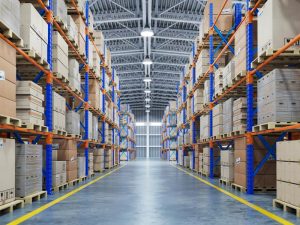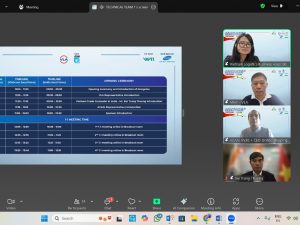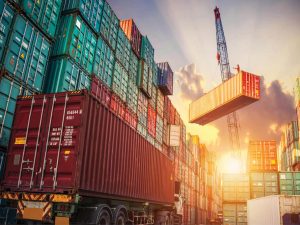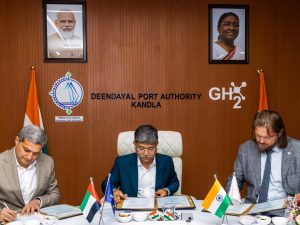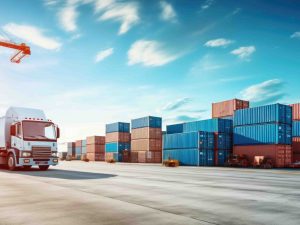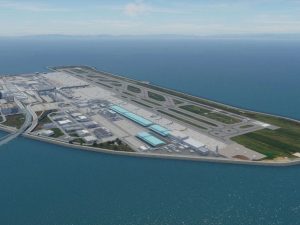To address the shortage of space for stores and logistics, the All India Institute of Medical Sciences (AIIMS) is reportedly looking out for space near Safdarjung airport to establish a centralised logistics hub that will be connected to the airport. “It is noted that at AIIMS New Delhi, there is an acute shortage of space for stores & logistics. As an interim measure, a few vacant houses had been allotted for such use cases. However, as these houses are being allotted and renovated for new occupants, there is a felt need for additional space in close proximity to AIIMS for establishing a logistics hub,” the order copy read. “There is a probability of a land parcel being available near Safdarjung Airport on which AIIMS can establish a logistics hub,” added reports.
Read More »Sustainable warehousing to expand by 270 mn sq. ft by 2030: JLL
According to JLL’s latest report titled ‘India’s sustainable warehousing landscape: A green print,’ the green warehousing sector in India is poised for exponential growth, with certified sustainable warehouse space expected to expand from current levels to approximately 270 million sq. ft by 2030. “In just five years India has witnessed a remarkable transformation in its warehousing landscape. Since 2019, Grade A warehousing stock across India’s major cities has expanded dramatically, growing 2.5 times from 88 million sq. ft to an impressive 238 million sq. ft by 2024. This growth reflects the increasing demand for high-quality storage and distribution facilities as India’s economy modernizes, and e-commerce continues its rapid expansion. More striking is the rise of institutional-grade warehousing space, which has tripled from 28 million sq-ft in 2019 to 90 million sq-ft by end of 2024. This surge demonstrates the growing confidence of major global investors who are bringing international sustainability standards to the Indian market,” the report added.
Read More »‘PLI scheme, Make in India have incentivized domestic manufacturing & FDI’
Ramanathan Rajamani, CEO, AISATS said, “The China+1 strategy, often interpreted as a diversification effort by global firms, should not be viewed as a shift away from China, but rather as an opportunity for other economies like India to complement global supply chain networks and meet the rising demand more collaboratively. In this evolving landscape, India has emerged as a natural partner due to its strong manufacturing capabilities, robust policy support, and improving logistics infrastructure. India’s large, skilled labour force offers cost-effective solutions across multiple sectors, making it an attractive choice for both existing and emerging supply needs. Policy reforms such as the Production-Linked Incentive (PLI) scheme and the Make in India initiative have further incentivized domestic manufacturing and foreign investment, particularly in areas of electronics, pharmaceuticals, and textiles. Geographically, India enjoys a strategic location with proximity to key Asian, African, and European markets, enabling smoother access to global trade routes. Its continued focus on infrastructure development, such as dedicated freight corridors, multimodal logistics parks, and port modernization, positions India as a reliable and resilient supply chain node. India’s participation in the “+1” strategy signals a shared role in building a more agile and diversified global supply chain, capable of absorbing shocks and responding to shifting geopolitical and economic priorities.”
Read More »VLA, ACAAI join hands to boost India-Vietnam EXIM trade
Ahead of FIATA World Congress, set to be held from October 6 to 10, 2025, in Hanoi, Vietnam Logistics Business Association (VLA) conducted virtual session of B2B ‘Matching Online Towards’ FIATA World Congress 2025 Initiative, with the purpose of connecting businesses and creating new opportunities for VLA members and international partners. The Air Cargo Agents Association of India (ACAAI) was invited to collaborate and discuss opportunities for connection, cooperation and business expansion for members of both sides, contributing to promoting trade between Vietnam and India in the coming time. Nguyen Duy Minh, Vice President of VLA said, “India is currently one of Vietnam’s top strategic economic partners. Bilateral trade between Vietnam and India has grown significantly in recent years, reaching over USD 15 billion in 2022, and is expected to further expand with the goal of hitting USD 20 billion in the near future. India is a key market in sectors such as pharmaceuticals, agricultural products, textiles, chemicals, and especially logistics and supply chain services. At the same time, Vietnam is becoming an increasingly important manufacturing and investment destination for Indian enterprises. There is a growing interest from Indian companies to enhance their footprint in Vietnam, particularly in logistics infrastructure, port development, and cold chain logistics.” Dinesh Krishnan, Chairman, ACAAI Southern Region also said, “India and Vietnam have longstanding trade and economic relations which have steadily grown over a period of time. From a meagre US$200 million in the year 2000, bilateral trade grew to April 2024 – March 2025 reached US$ 15.76 billion, registering an increase of 6.40 percent year on year. In FY 2024-2025, Vietnam is India’s 20th largest trading partner and 15th largest export destination globally. India …
Read More »CONCOR, Ritco join forces to strengthen multimodal logistics
Ritco Logistics has entered into a partnership with the Container Corporation of India Ltd. (CONCOR) to foster operational efficiency at the multimodal logistics parks. As part of this agreement, Ritco will operate as a Business Associate of CONCOR. The collaboration aims to provide Ritco with access to CONCOR’s network of 70 multimodal logistics hubs, enabling it to expand operations across key trade routes and underserved regions. This is expected to improve cargo movement efficiency and reduce transit times.
Read More »DP World inks pact to boost rail freight technology
DP World, the Deendayal Port Authority (DPA), and Nevomo have signed MoU to explore potential opportunities for cooperation in the development and implementation of a pilot project using Nevomo’s MagRail proprietary technology for the self-propelled movement of rail-based cargo and freight within the existing port ecosystems. DP World is leading efforts to introduce advanced freight technology aimed at transforming cargo movement in India. Deendayal Port Authority (DPA), a key multi-cargo port under the Government of India, is facilitating exploration of this technology at its terminal in Kandla to evaluate the feasibility of this futuristic freight transportation system. The initiative marks a significant step toward building faster, more efficient, and sustainable port-hinterland connectivity. This initiative is aligned with India’s National Logistics Policy and PM Gati Shakti agenda aimed at modernizing and integrating the country’s logistics infrastructure. The MoU was signed by Shri Sushil Kumar Singh, IRSME, Chairman of Deendayal Port Authority (DPA), Rizwan Soomar, CEO & Managing Director, Middle East, North Africa, India Subcontinent, DP World, and Przemek (Ben) Paczek CEO Nevomo Group BV along with other senior dignitaries in Kandla, Gujarat, on 15th July 2025. The MoU sets the framework for a 750-metre pilot project of MagRail technology at Deendayal Port. A first-of-its-kind initiative in India will demonstrate self-propelled freight movement within a live port environment. It aims to develop and implement MagRail-based solutions that enable autonomous, electric-powered wagons using linear motor technology on existing rail tracks, enhancing capacity, efficiency, and speed for containerized and bulk cargo while reducing costs and CO2 emissions, making the logistics systems greener, faster, and more interoperable.
Read More »‘GHIAL plans to expand capacity at terminal 1 and 2 by FY26’
Informing about GMR Hyderabad Airport’s expansion plans, Pradeep Panicker, CEO, GHIAL said, “The current cargo infrastructure at Hyderabad is undergoing significant expansion to meet growing demand. The Existing Cargo terminal-1 can handle 1,50,000 MT per year. It is being upgraded to double the existing capacity and, upon completion, will feature a state-of-the-art Domestic Terminal, an International Courier/Express Terminal, and a dedicated Export Perishables Terminal, all aimed at enhancing operational efficiency and customer satisfaction. Additionally, construction of the new Cargo Terminal 2 is in progress, substantially increasing overall handling capacity to 350,000 MT by end of FY26.”
Read More »ATL raises Rs 38.28Cr to build capacity, CFS &ICD
Allcargo Terminals Ltd (ATL) has announced a proposal to raise Rs. 38.28 Cr. through the issuance and allotment of up to 1,32,00,000 Fully Convertible Warrants to the Promoters/Promoter Group. The Board of Directors of ATL has approved the preferential allotment in its meeting held on July 15, 2025. Each warrant has a face value of ₹2 per share, at an issue price of Rs. 29 per warrant at a premium of Rs.27 per warrant, subject to shareholder and regulatory approvals. This issuance accounts for approximately 5% of ATL’s post-conversion equity share capital and is priced at a ~1% premium to the SEBI-defined floor price. This kickstarts ATL’s three year expansion plans. ATL has a current capacity of 8.3L TEUs annually across its seven facilities in five hubs that handle approximately 80% of India’s EXIM trade. ATL plans to augment its capacity to over 13L in the coming three years – by expanding some of its key facilities and by developing new CFS/ICD facilities. This strategic move is in line with ATL’s long-term growth roadmap and will support the company’s multi-location infrastructure expansion at Mundra and Nhava Sheva, Greenfield ICD at Farukhnagar and infra upgrades at existing facilities. Currently operating at 80–85% capacity utilisation, the expansion plans will enable the company to cater to future demand and consolidate its leading position in key logistics corridors.
Read More »Maharashtra to build India’s first offshore Airport in 2026
Maharashtra is all set to build India’s first offshore Airport and Mumbai’s third Airport near the upcoming Vadhavan Port. The construction work will begin in 2026 said, Chief Minister Devendra Fadnavis. “Maharashtra plans to build India’s first offshore airport near Vadhavan Port, an innovative solution to Mumbai’s chronic airport congestion, inspired by Japan’s Kansai International Airport, completed in 1994 on a man-made island after overcoming major engineering challenges,” said reports.
Read More »‘India’s scale, policy support & investment benefitting the sector’
Global companies are diversifying their manufacturing and sourcing bases across Asia due to the ever-evolving geo-political developments,” said, Huned Gandhi, Managing Director, Air & Sea Logistics at Dachser India. He added, “As a result, several countries including Vietnam, Thailand, Indonesia and India are being integrated more deeply into the global value chains. Each location offers distinct advantages, whether in terms of cost, infrastructure, trade agreements, or workforce capabilities. India is steadily positioning itself as a reliable long-term partner, especially in sectors such as automotive, pharmaceuticals, textile and garments and also electronics. While Southeast Asia has seen early traction due to proximity and existing trade ties, India’s scale, policy support and investment in logistics infrastructure are creating long-term advantages. This broader regional diversification is fostering a more resilient and multi-modal supply chain landscape across Asia.”
Read More » Cargo Breaking News
Cargo Breaking News

